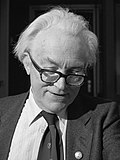History
The 1922 general election was the first in which the Labour Party finished in second place, therefore also forming the Loyal Opposition for the first time. Although J. R. Clynes had overseen the gain of 85 seats as party leader at the general election, he was challenged for the leadership on 21 November by former leader Ramsay MacDonald. In a vote among the party's MPs, MacDonald won by 61 to 56, becoming the first Labour Leader of the Opposition. MacDonald immediately offered to create the position of deputy leader for Clynes, appointing him to the position immediately, with the role becoming officially codified by the National Executive Committee days later.
Between 1922 and 1952, deputy leaders were appointed by acclamation among Labour MPs. In August 1931, Labour MPs decided to appoint a second Deputy Leader, with William Graham chosen to serve alongside Clynes; this marked the first and, to date, only time there have been two deputy leaders serving concurrently. Despite both losing their seats later that year at the general election, they initially remained as joint deputy leaders. Graham died in January 1932 and Clynes resigned as Deputy Leader in October 1932, with only one person holding the position from then on. On 11 November 1952, for the first time, there was a contested election for the position, after Aneurin Bevan challenged the incumbent Herbert Morrison (Morrison won by 194 votes to 82). Deputy leadership elections were subsequently held on the same basis and rules as leadership elections, although were typically more frequent, as it was more common for MPs to challenge a sitting deputy leader than a sitting leader.
Following the 1980 Labour Party Conference, new leadership and deputy leadership rules were adopted that would see the two roles chosen via the alternative vote, with an electoral college having a third of votes allocated to Labour MPs and MEPs, a third to individual members of the Labour Party, and a third to individual members of all affiliated organisations, including socialist societies and trade unions. The first election held under these rules came in 1981, when Tony Benn challenged the incumbent Denis Healey for the position. At a time when the Social Democratic Party had been formed by several former Labour MPs, the 1981 deputy leadership election came to be seen as a hugely significant moment in the history of the Labour Party, after the more moderate Healey defeated the more left-wing Benn by just 0.8%. [1] Deputy leadership elections were held concurrently with leadership elections on these rules until 2015, when the party switched to a "one member, one vote" system. Candidates for the deputy leadership now require nomination by at least 20% of Labour MPs to appear on the ballot.
In 1995, the office of Deputy Prime Minister of the United Kingdom (previously only held once by Clement Attlee as a result of the wartime coalition government) was revived and began to be held frequently by senior politicians in the governing party. John Prescott became the first Deputy Leader of the Labour Party to hold this position, holding it under Tony Blair from 1997 to 2007. In 2024, Angela Rayner became the second Deputy Leader of the Labour Party to hold this position, as well as the first woman to serve as a Labour Deputy Prime Minister. As the deputy leadership is a party role, with no constitutional position, the role of Deputy Prime Minister is not guaranteed to any deputy leader when the Labour Party is in government. In 2007, newly appointed Labour Leader and Prime Minister Gordon Brown announced that the newly elected Deputy Leader, Harriet Harman, would instead become Party Chair and appointed her Leader of the House of Commons and Lord Privy Seal in the Cabinet.
According to the Labour Party's constitution, in the event of a vacancy in the party leadership while the party is in Opposition, the Deputy Leader will automatically become Acting Leader until a new leader can be elected. If a leadership vacancy occurs while the Labour Party is in government, the Cabinet, in consultation with Labour's National Executive Committee, will select a temporary leader who will serve until a new leader can be elected. [2] The latter situation has only occurred twice, when Harold Wilson resigned as leader in 1976 and when Tony Blair resigned as leader in 2007, but in both cases each remained in office until, respectively, James Callaghan and Gordon Brown were elected their successors, and so no Acting Leader was required.
To date, the only deputy leaders who have gone on to be elected Leader of the Labour Party are Clement Attlee and Michael Foot. Conversely, J. R. Clynes served initially as party leader, before being appointed the first Deputy Leader. Three deputy leaders have served as Acting Leaders; George Brown in 1963 following the sudden death of Hugh Gaitskell, Margaret Beckett following the equally sudden death of John Smith in 1994, and Harriet Harman, twice, following the resignations of Gordon Brown in 2010 and Ed Miliband in 2015 respectively. All three served concurrently as Leader of the Opposition during their periods as Acting Leader of the Labour Party.


















